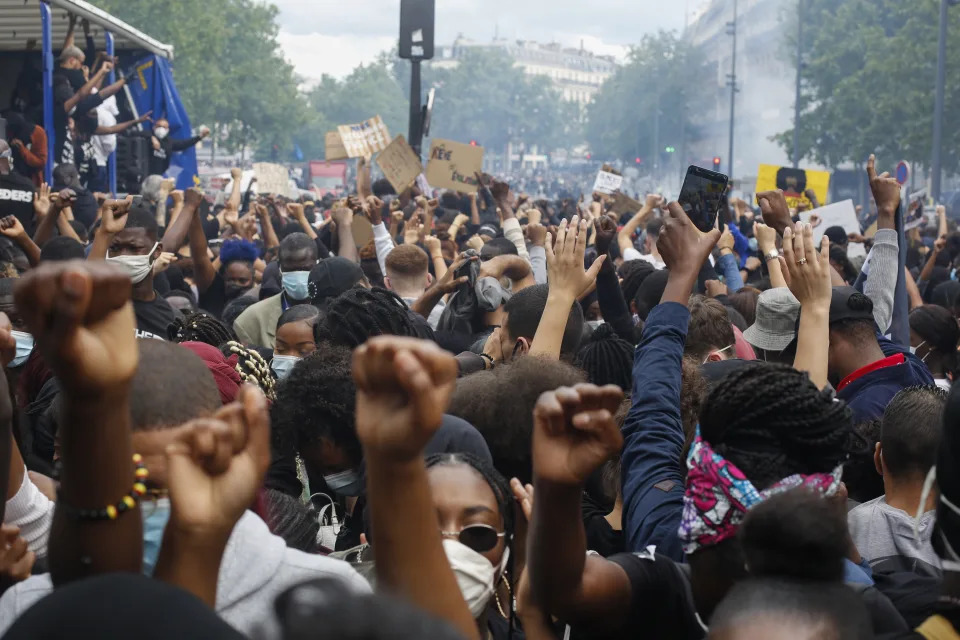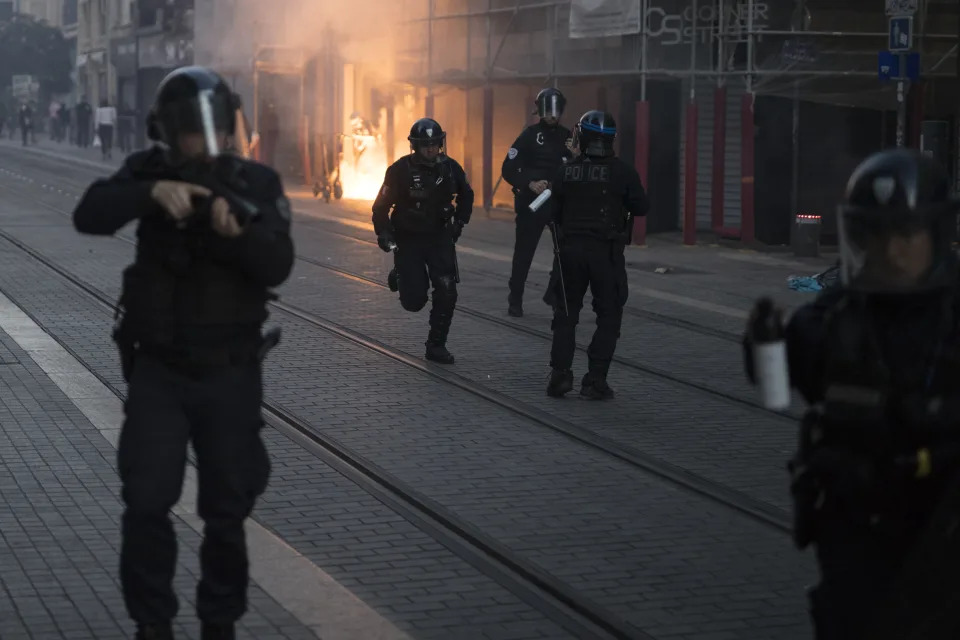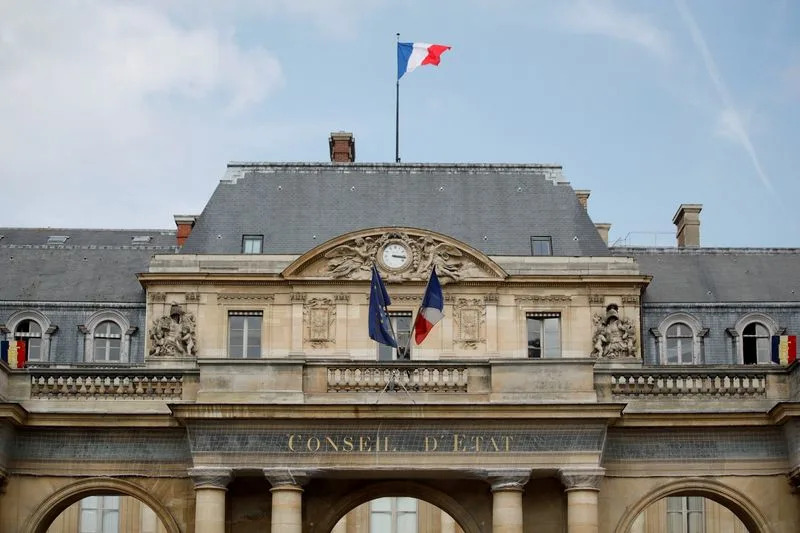ANGELA CHARLTON
Fri, September 29, 2023


Police take on protesters during a march against police brutality and racism in Marseille, France, on June 13, 2020. France’s highest administrative authority held a landmark hearing over accusations of systemic discrimination in identity checks by French police. Local grassroots organizations and international rights groups filed France’s first class-action lawsuit targeting the nation’s police force.
(AP Photo/Daniel Cole, File)
PARIS (AP) — France’s highest administrative authority held a landmark hearing Friday over accusations of systemic discrimination in identity checks by French police. Victims are not seeking money, but a ruling to force deep reforms within law enforcement to end racial profiling.
Local grassroots organizations and international rights groups allege that French police target Black people and people of Arab descent in choosing who to stop and check. They filed France's first class-action lawsuit against police in 2021, and the case reached the Council of State on Friday.
The government has denied systemic discrimination by police, and has said that police officers are increasingly targeted by violence.
A decision is expected in the coming weeks.
“This was a big step in a battle that I hope we will win one day,’’ said Achille Ndari, who attended Friday's hearing and who is among those whose personal accounts informed the lawsuit.
He said he was targeted by a rough police ID check for the first time during his first year of law school, and that it made him cry in his bed. Ndari, who is Black, said it shook his confidence in himself, his identity and France’s system of law and order.
Now a street performer in Paris, he described his awe after attending Friday’s hearing, and the feeling that the experiences of people like him were finally heard.
“It’s not everyone who has the chance to go to such a place'' as hallowed as the Council of State, he said. “Now there will always be a trace of our suffering, our invisible, silent suffering.’’
Police officers who corroborate accounts of discriminatory checks are among people cited in a 220-page file submitted by the groups’ lawyers to the Council of State.
Critics have said such ID checks, which are sometimes rough and often carried out multiple times on the same person, can mark young people for life and worsen the relationship between police officers and residents of many low-income neighborhoods.
The hearing comes amid lingering anger over the killing of a 17-year-old of North African origin by police during a traffic stop in June. Nahel Merzouk's death in the Paris suburb of Nanterre unleashed protests that morphed into nationwide riots. Tens of thousands of people marched last weekend around France to denounce police brutality and racism.
The case heard Friday focuses on ID checks, and was initiated by Amnesty International, Human Rights Watch, Open Society Justice Initiative and three grassroots organizations that work with young people. The NGOs took the case to the Council of State after the government failed to meet a deadline to respond to the class-action suit.
French courts have found the state guilty of racial profiling in identity checks in the past, but the case heard by the Council of State is different in that it is seeking reforms instead of damages.
The groups that filed the lawsuit want to require police to record data about identity checks and to abolish preventive ID checks; limits on checks targeting children; new training for police; and an independent mechanism to lodge complaints against police.
“We hope this hearing will bring recognition by the law of the injustice that young people of color in French cities face every day. To be stopped by police in the middle of the street for no reason; to be spread-eagled, to have your ID checked, to be frisked in front of everyone,″ Issa Coulibaly, head of community youth group Pazapas, said in a statement by the Open Society Justice Initiative.
Coulibaly, a Black man in his 40s, has described being subjected to numerous undue ID checks starting when he was 14.
French court should reject lawsuit on police racial profiling, adviser says
PARIS (AP) — France’s highest administrative authority held a landmark hearing Friday over accusations of systemic discrimination in identity checks by French police. Victims are not seeking money, but a ruling to force deep reforms within law enforcement to end racial profiling.
Local grassroots organizations and international rights groups allege that French police target Black people and people of Arab descent in choosing who to stop and check. They filed France's first class-action lawsuit against police in 2021, and the case reached the Council of State on Friday.
The government has denied systemic discrimination by police, and has said that police officers are increasingly targeted by violence.
A decision is expected in the coming weeks.
“This was a big step in a battle that I hope we will win one day,’’ said Achille Ndari, who attended Friday's hearing and who is among those whose personal accounts informed the lawsuit.
He said he was targeted by a rough police ID check for the first time during his first year of law school, and that it made him cry in his bed. Ndari, who is Black, said it shook his confidence in himself, his identity and France’s system of law and order.
Now a street performer in Paris, he described his awe after attending Friday’s hearing, and the feeling that the experiences of people like him were finally heard.
“It’s not everyone who has the chance to go to such a place'' as hallowed as the Council of State, he said. “Now there will always be a trace of our suffering, our invisible, silent suffering.’’
Police officers who corroborate accounts of discriminatory checks are among people cited in a 220-page file submitted by the groups’ lawyers to the Council of State.
Critics have said such ID checks, which are sometimes rough and often carried out multiple times on the same person, can mark young people for life and worsen the relationship between police officers and residents of many low-income neighborhoods.
The hearing comes amid lingering anger over the killing of a 17-year-old of North African origin by police during a traffic stop in June. Nahel Merzouk's death in the Paris suburb of Nanterre unleashed protests that morphed into nationwide riots. Tens of thousands of people marched last weekend around France to denounce police brutality and racism.
The case heard Friday focuses on ID checks, and was initiated by Amnesty International, Human Rights Watch, Open Society Justice Initiative and three grassroots organizations that work with young people. The NGOs took the case to the Council of State after the government failed to meet a deadline to respond to the class-action suit.
French courts have found the state guilty of racial profiling in identity checks in the past, but the case heard by the Council of State is different in that it is seeking reforms instead of damages.
The groups that filed the lawsuit want to require police to record data about identity checks and to abolish preventive ID checks; limits on checks targeting children; new training for police; and an independent mechanism to lodge complaints against police.
“We hope this hearing will bring recognition by the law of the injustice that young people of color in French cities face every day. To be stopped by police in the middle of the street for no reason; to be spread-eagled, to have your ID checked, to be frisked in front of everyone,″ Issa Coulibaly, head of community youth group Pazapas, said in a statement by the Open Society Justice Initiative.
Coulibaly, a Black man in his 40s, has described being subjected to numerous undue ID checks starting when he was 14.
French court should reject lawsuit on police racial profiling, adviser says
Layli Foroudi
Fri, September 29, 2023

A view shows the Conseil d'Etat, France's highest administrative court, in Paris
By Layli Foroudi
PARIS (Reuters) - An adviser to France's top administrative court urged it on Friday to reject a class action lawsuit against the state alleging police inaction on racial profiling, saying the government could not be held at fault over a lack of reform.
Six human rights groups petitioning the Conseil d'Etat (State Council) argued the police discriminate against young Arab and Black men during routine patrols. The case asks the council to require concrete reforms from the government.
If successful, the landmark petition could open the way for similar broad legal challenges in a country where activism has traditionally taken the form of direct protest, and where class actions only became possible in 2014 and remain rare.
At Friday's hearing, the adviser, public rapporteur Esther de Moustier, said judges did not have the power to impose legislative changes and that the state could not be held "at fault" if policy measures had not brought results.
The State Council, of which the public rapporteur is a member, is not bound by such opinions but follows the adviser's lead in most cases.
A decision in the case is expected in the coming weeks.
A lawyer for the rights groups, which include Amnesty International and Human Rights Watch, urged the council not to follow the recommendation.
Rejecting the case would be like saying that "the pain exists, but the doctor doesn't want to intervene," said the lawyer, Antoine Lyon-Caen.
The rights groups' case is supported by statements from 40 victims as well as police.
The government and police are under scrutiny after an officer shot dead Nahel, a teenager of North African descent, during a traffic stop in June, bringing long-simmering resentment among urban immigrant communities to the boil.
Lawyer Slim Ben Achour, who has defended racial profiling victims in cases where the state was found to be at fault, said if the court rejects this type of class action "it will be catastrophic and an important indicator for what is happening in this country".
(Reporting by Layli Foroudi; editing by Rami Ayyub)
No comments:
Post a Comment